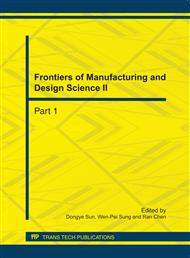p.1372
p.1377
p.1382
p.1387
p.1392
p.1397
p.1402
p.1407
p.1411
Study and Improving on Adaptive Filter
Abstract:
In this paper the principle of adaptive filter and various least mean square (LMS) adaptive filter algorithm is studied, based on the related hyperbolic tangent function LMS algorithm is presented, referred to as CTanh-LMS algorithm. Simulation results show that, compared with other adaptive filter algorithm, this method has better denoising ability, and the algorithm is simple, fast convergence rate, and can satisfy the gearbox vibration signal denoising requirements. The proposed algorithm can not only solve the gearbox fault feature extraction, and give adaptive filter algorithm research provides a new means, has important theoretical significance and practical value.
Info:
Periodical:
Pages:
1392-1396
Citation:
Online since:
October 2011
Authors:
Price:
Сopyright:
© 2012 Trans Tech Publications Ltd. All Rights Reserved
Share:
Citation:


